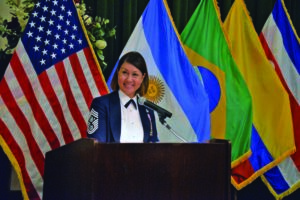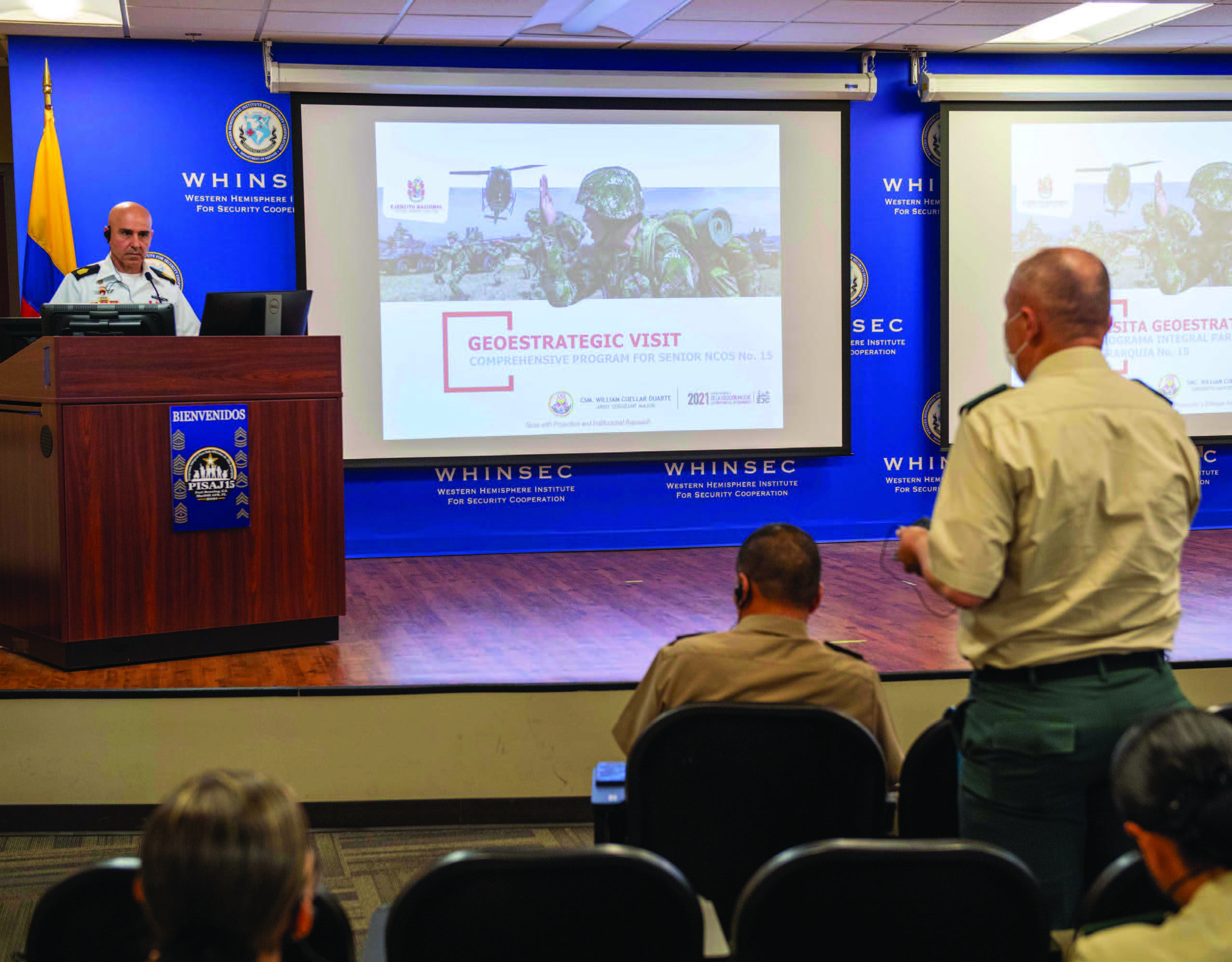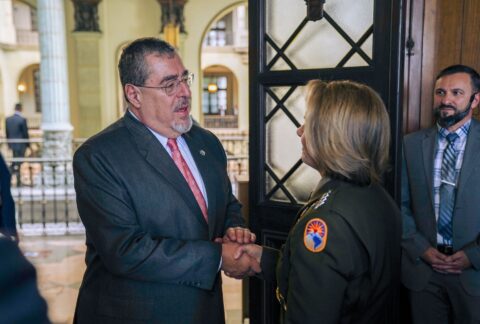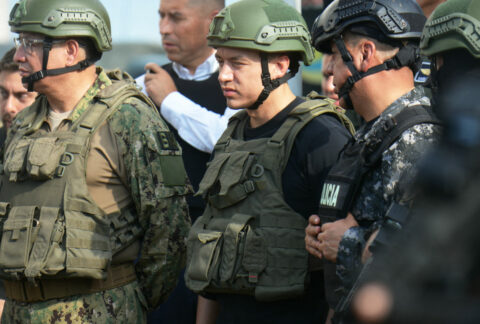They are the doers of the armed forces, the eyes and ears of their commanders, who guide and inspire the troops to get the job done. Often referred to as the backbone of the military, noncommissioned officers (NCO) have long been recognized within the U.S. service branches as critical to maintaining a competitive advantage.
While not all nations have embraced NCO development, many, thanks to the support of U.S. combatant commands, have made great strides in empowering their NCOs. Indeed, in the six years since its inception, U.S. Southern Command’s (SOUTHCOM) Enlisted Leader Professional Development (ELPD) program has been sharing experiences, best practices, and lessons learned with partner nations (PN) of Latin America (LATAM) and the Caribbean eager to professionalize their NCO corps. As of mid-2021, the ELPD program has been involved with up to 20 PNs in the hemisphere through NCO exchanges, hands-on training, exercises, and conferences with support from regional defense institutions.
“Our goal regarding ELPD is not to force our model on any country, but simply to share […]. Hence, we stand ready to support all of our trusted partners with the professionalization of their enlisted forces, according to their current and future goals,” said U.S. Army Master Sergeant Danny Gomes, former ELPD program manager for SOUTHCOM.

KEY ROLE
Throughout the history of the U.S. military, whenever technology, military strategies, or the rules of war have evolved, the role of the NCO has followed suit. Faced with more decentralized and complex battlefields, enlisted leaders (EL) had to take on more leadership duties. Today, they play a critical role in the operational effectiveness and institutional advances of the armed forces. For SOUTHCOM, this meant investing in the NCOs of PNs to improve readiness and capabilities in support of regional security operations, with the creation of the ELPD program — previously known as the NCO Development Partnership program.
Established in 2016, the ELPD program fell under the four military imperatives identified by then SOUTHCOM commander, U.S. Navy Admiral Kurt W. Tidd. In addition to the development of a professional NCO corps, Adm. Tidd considered respect for human rights, the institutionalization of a culture of enhanced jointness, and the pragmatic integration of gender perspectives into military operations as hallmark characteristics of capable, modern defense forces. “A strong NCO corps equals a strong military,” said Adm. Tidd then.
PART OF MISSION SUCCESS
In 2021, the ELPD program hit two military imperatives with the launch of a series of panels on Women, Peace, and Security (WPS) for women senior NCOs of the Americas. The first two panels, held virtually in March and July, exceeded all expectations with the participation of thousands of female personnel from the region.
“For most defense forces, the enlisted corps is the pillar of the force […],” said U.S. Air Force Lieutenant Colonel Duilia Turner, WPS program chief at SOUTHCOM, and moderator of the panels. “So from there, it’s very important that we focus and that we professionalize the enlisted corps, but we cannot do that if we do not include women, because we know that the teams that are the most cohesive, that respond best, that are the best performers, are the teams that include different perspectives.”
The WPS conferences for senior women NCOs of the Americas have highlighted the importance and increased representation of women serving in the enlisted forces of the region. As U.S. Air Force Master Sergeant Keyla M. Watt, Inter-American Air Forces Academy (IAAFA) first sergeant, put it: “One of the most notable breakthroughs is a general acceptance by LATAM/Caribbean that diversity and inclusion must be a cornerstone of their defense institutions.”
According to Master Sgt. Watt, there’s been a growing demand from PNs to add themes related to WPS into the curriculum of IAAFA, one of the institutions SOUTHCOM’s has partnered with to support NCO development and education across the hemisphere. “Additionally, our academy continues to see an increase in the number of female students attending our courses and the number of female guest instructors; these are significant long-term investments for our PNs.”
In October 2021, IAAFA launched the Inter-American Senior NCO Academy, its first senior NCO course, with a focus on culture, leadership, mission, and problem-solving that saw the participation of students from Colombia, Costa Rica, and El Salvador, as well as U.S. Air Force (USAF) senior NCOs. “Most recently LATAM PNs have come to understand the critical role USAF NCOs play in the execution of operations. In light of this IAAFA […] developed a course that aims to grow PNs’ senior NCO capacity to lead at the highest levels of military hierarchy and to advise senior leaders,” said USAF Colonel José E. Jiménez Jr., IAAFA commandant. Hundreds of NCOs from the Americas have already graduated from IAAFA’s Inter-American NCO Academy, a course that prepares ELs for leadership and management responsibilities.
The Western Hemisphere Institute for Security Cooperation (WHINSEC), another partner institution of SOUTHCOM, has also greatly contributed to the success of the ELPD program. As a multinational interagency environment, WHINSEC brings a high level of knowledge and experience it shares with NCOs of the Americas through three courses taught in Spanish. The quality of the training at WHINSEC, said U.S. Army Command Sergeant Major José S. Lopez, WHINSEC command sergeant major, can best be illustrated with a quote from a PN Air Force commander, who during a recent visit remarked, “When I was in the process of selecting my senior enlisted advisor, there were three outstanding candidates. I decided to select a recent graduate of the Senior Enlisted Advisor Course taught at WHINSEC.”
Another case in point is Dominican Army Staff Sergeant Rosa Mancebo, a panelist in the July senior NCO WPS conference and a WHINSEC graduate, who stands out for being the first female promoted to staff sergeant, a rank the Dominican Republic signed into law in 2013. Today, Staff Sgt. Mancebo is one of nine female NCOs in the Dominican Armed Forces. A female trailblazer, Staff Sgt. Mancebo also gets to inspire future NCOs through her role as the administrator of the Staff Sergeant Course at the Dominican Army NCO infantry school.
“As a senior NCO, I have been able to be an agent multiplier of the knowledge and experiences that I have acquired throughout my military career,” said Staff Sgt. Mancebo, who joined in January 2012. “Being a pioneer as a female soldier, and at the same time being part of the first promotion of NCOs […], has been very important for female soldiers because this represents another step forward and another door that opens for all of them.”

LEAPS AND BOUND
In addition to the senior NCO WPS seminars, other SOUTHCOM-sponsored conferences have been focusing on NCO professionalization, such as the South American Defense Conference (SOUTHDEC), which Senior Enlisted Leaders Seminar runs parallel to the meeting of armed forces’ commanders since 2017, or the Conference of American Armies (CAA), which, in its 2020 and 2021 forums, focused on strengthening the NCO corps of all the armies of the region.
Other examples of the success of the ELPD program include the current development of a curriculum for sergeant first class and first sergeant in the Dominican Armed Forces. Also, in mid-2021, at the request of the Colombian senior enlisted advisor to the chairman (SEAC) of the Joints Chiefs of Staff, SOUTHCOM’s ELPD team visited all of their military educational institutions and facilities to assess their current conditions and identify areas of potential improvement. The Jamaica Defence Force requested and received the same assistance with full assessment of their current ELPD and professional military education structure to prepare for the growth planned for its force in the next few years. As for Guatemala, it plans to train and develop hundreds of NCOs and petty officers by 2022, assigning them greater responsibility as part of its ELs professionalization efforts.
Between 2016 and 2020, Argentina, Colombia, Ecuador, and El Salvador also implemented and filled the position of SEAC; Brazil and Peru implemented the position of sergeant major of the Army, while SOUTHCOM representatives met with many LATAM and Caribbean NCOs to exchange ideas on how to support the role of ELs and develop breakthrough workshops to support greater professionalization of the NCOs.
As such, the ELPD program has made leaps and bound in LATAM and the Caribbean since its inception, from the creation of new ranks to assigning greater responsibility to men and women ELs to increased participation in international military education courses to the request for more training opportunities.
“The ELPD program is here to stay, in one way or another, for a very long time,” said U.S. Army Sergeant Major James “Jim” Campbell, who assumed the role of ELPD program manager for SOUTHCOM in July 2021. “EL development is not something that you can do once and then say that you’re all done. It’s a longterm commitment that constantly evolves, so that what it will look like in the future really depends on what our partners want. […] Our goal is to continue to be a good partner in the region and work with our partners to help them achieve that.”
Perhaps, U.S. Army Command Sergeant Major Benjamin Jones, SOUTHCOM command sergeant major, summed it best during his closing remarks at the first senior NCO WPS seminar held in March. “We have come a long way in the Western Hemisphere […] but there’s still much work to be done. Find your definition of success and continue to look and work toward it. You may hit a few roadblocks along the way, but if you keep moving forward, you will definitely reach your destination — and that my friend is success.”









